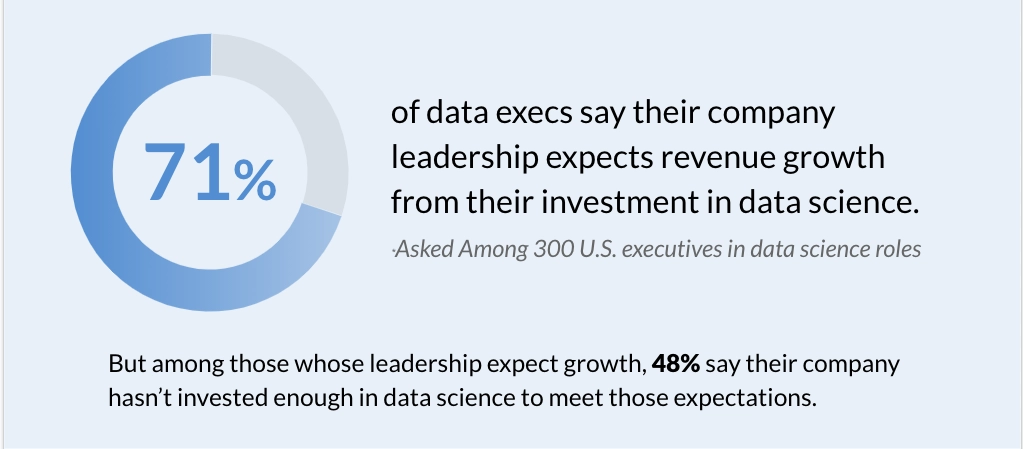
The world’s most sophisticated companies overwhelmingly count on data science as a key driver for their long-term success. But according to a new survey of 300 data science executives at companies with more than $1 billion in annual revenue, flawed investments in people, processes, and tools are causing failure to scale data science.
These obstacles are evidence that doing data science is hard, and progress requires a level-headed assessment of an organization’s “data science maturity” and associated resource needs for achieving the successful creation, deployment, and maintenance of production models at scale.
The survey revealed five clear conclusions:
- Short-term Investment thwarts growth expectations
- Role of data science is unclear
- More revenue requires better models
- Unimproved models bring higher risk
- Teams must clear the obstacles to achieve goals
The accompanying report, Data Science Needs to Grow Up: The 2021 Domino Data Lab Maturity Index, unravels a set of findings that show how and why companies struggle to scale data science, despite their best efforts to do so. Among its findings:
Expectations outpace investment, with “splashy” short-term investments outnumbering sustained commitments:
- While 71% of data executives say their company leadership expects revenue growth from their investment in data science, a shocking 48% say their company has not invested enough to meet those expectations.
- Instead, they say organizations seem focused on short-term gains. In fact, more than three-quarters (82%) of those polled said their employers have no trouble pouring money into “splashy” investments that yield only short-term results.
Companies struggle to execute on the best-laid plans to scale data science
- More than 2 in 3 data executives (68%) report it’s at least somewhat difficult to get models into production to impact business decisions— and 37% say it’s very to extremely difficult to do so.
- Nearly 2 in 5 data executives (39%) say a top obstacle to data science having a great impact are the inconsistent standards and processes found throughout their organization.
Companies face shortages of skilled, productive employees and the tools they need
- 48%of data executives complain of inadequate data skills among employees, or not being able to hire enough talent to scale data science in the first place (44%).
- More than 2 in 5 data execs say their data science resources are too siloed off to build effective models (42%), and nearly as many (41%) say they have not been given clear roles.
Growing Risk for Misguided Models
The study also explored what keeps data science leaders up at night. The results deliver a stark warning for companies cutting corners with data science:
-
A shocking 82% of those polled say their company leadership should be concerned that bad or failing models could lead to severe consequences for the company, and 44% report a quarter or more of their models are never updated. Respondents name several shocking consequences of model mismanagement, including:
- Bad decisions that lose revenue (46%)
- Faulty internal KPIs for staffing or compensation decisions (45%)
- Security and compensation risks (43%)
- Discrimination or bias in modeling (41%)
Introducing The Domino Data Lab Maturity Index
In addition to the survey results, this report debuts the Domino Data Lab Maturity Index: an independent assessment of organizational data science health. The Maturity Index was administered to each survey respondent. It measured organizations’ ability to use the right tools, hire the right number of productive data scientists, get models into production at scale, and coordinate the complex efforts of large teams across the enterprise.
The results of the survey were compared to the Maturity Index assessment from Domino and the results were striking, showing a strong correlation between increased revenue and Maturity Index performance. Leaders seeking to capture the expected return on their data science investments can use the Domino Data Science Maturity Index as a tool for achieving better models and financial results.
One truly fascinating finding is that the survey validates our long-held position that companies with greater data science maturity see drastically higher returns on their investment — for instance, while more than two in three data execs are concerned about getting models into production in order to impact business decisions, 53% of data executives at High Maturity companies have little to no difficulty getting models into production, more than double the 25% at Low Maturity companies who say the same.
Curious to learn more insights about what sets High Maturity companies from their Low Maturity counterparts when it comes to data science? Our new report, Data Science Needs to Grow Up: The 2021 Domino Data Lab Maturity Index, shines a light on disparities between them. Download it now!
Follow Domino Data Lab on Twitter, LinkedIn and Facebook for more insights from this report and other useful content about how MLOps can help the world’s most sophisticated companies solve the world’s most important problems using data science.
Categories
Visit Domino News for press releases and mentions.
Visit the Data Science Blog to learn about data science trends, tools, and best practices.